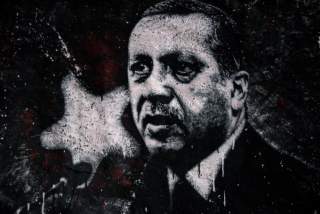Sleepless in Ankara: The Post-Erdogan Government's Big Challenges
Will the new government be able to pull Turkey out of its slump and mend relations with the West?
How the West Will React
With the onset of a non-Erdogan-led Turkish government, Turkey’s Western partners are likely reassessing their relations with Ankara. In the last few years, Turkey has faced difficulties in its relationships with its transatlantic partners. Accession negotiations with the EU have stalled. In the past four years, only one negotiating chapter was opened. A further thirteen remain blocked due to political difficulties over the Cyprus conflict and the legacy of the Sarkozy government in France, which fiercely opposed Turkey’s EU membership. Moreover, Euroskeptic parties have gained ground in Europe, winning a record number of seats in the May elections of the European Parliament and are likely to vocally oppose closer ties with Turkey over the next five years.
It is, therefore, difficult to be optimistic about the short-term prospects for Turkish-EU relations. Given the positive role that the EU dynamic has formerly played, it is unfortunate that the EU’s transformational impact on Turkey is waning. The challenge will be to prevent a total loss of the accession momentum. One particularly useful policy initiative would be to deepen Turkish-EU economic integration. Upgrading the Turkey-EU Customs Union agreement, which had entered into force in 1995, could achieve this aim. A new round of negotiations aimed at enlarging the scope of agreement by including new sectors, such as services and agriculture, or new policy areas, such as public procurement and dispute settlement, could kick-start the much-needed dialogue and rekindle the interest of Turkey’s large and influential business community toward the goal of EU membership.
This objective is in line with Turkey’s desire to become part of the enlarged transatlantic market to be set afoot by the Transatlantic Trade and Investment Partnership (TTIP). Turkey views TTIP as the economic pillar of the transatlantic community. For Turkish policy makers, TTIP should not be concluded as a purely bilateral arrangement between Brussels and Washington. This would be tantamount to introducing new divisions within the Transatlantic Alliance. Under such a scenario, non-EU NATO members would be marginalized from market access and benefits at a time when the entire Alliance is in desperate political need of strengthening the transatlantic bond. Rather, TTIP should be designed in such a way that, once concluded between the EU and the United States, it would remain open to the accession of like-minded countries. Knowing this, Brussels and Washington should find the right institutional formula to ensure this open-door policy for TTIP. One solution would be to incorporate a suitably designed accession clause within the original agreement. Alternatively, the conclusion of a Turkey-U.S. Free Trade Agreement would erode Ankara’s fears of being excluded from this ambitious economic project.
Going forward, for the new government faced with intractable difficulties over its relations with the EU and having to operate in an increasingly hostile regional-security environment, a sound and frictionless relationship with Washington will be indispensable. For Washington as well, a Turkish government that is more cooperative and eager to engage will be an unrivaled advantage as regional-security concerns increase, particularly if an international intervention is needed to prevent ever-larger bits of territory falling into disorder and lawlessness in Turkey’s southern neighborhood.
With Erdogan set to relinquish his position as prime minister, a realignment of the power constellation in Turkey is inevitable. A new political leadership will emerge from within the ranks of the ruling AKP. This can be the moment for Turkey to reposition itself as a valued member of the Western community of nations, albeit with a proactive Middle East policy, rather than to pursue its more recent aspirations of becoming a more independentist regional power with a conflictual agenda. Power in the new world order is the power to establish effective partnerships and alliances. It is time for Turkey’s leadership to rediscover this truth.
Sinan Ulgen is a former Turkish diplomat. He is currently the chairman of the Istanbul based EDAM think tank and a visiting scholar at Carnegie Europe. Follow him on Twitter: @sinanulgen1.
Image: Flickr/Abode of Chaos/CC by 2.0

